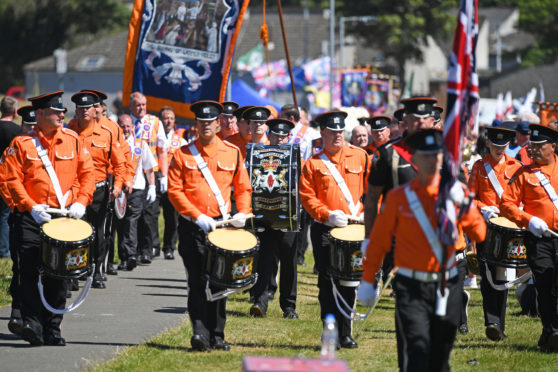The new Justice Secretary Humza Yousaf has promised to put hate crime at the top of his agenda, in the wake of an attack on a Catholic priest during an Orange march in Glasgow.
This is to be welcomed if it has any effect at all in deterring the nastier elements of Scottish society. There are pockets of sectarianism in Scotland that would shame any country, let alone one that prides itself on its egalitarianism.
This ugliness most often flares up at football matches and so is dismissed as being about football, not prejudice, a justification that some of us have never understood.
But when Canon Tom White claimed he was spat on outside his church as the Orange parade passed by, the recently promoted justice secretary decided it was time to act.
“This anti-Catholicism on the streets of Glasgow is no different from Islamophobia or anti-Semitism,” said Yousaf. “If it had been an imam or a rabbi that had been abused in the way Canon Thomas White was allegedly abused, there would have been universal condemnation of it.”
As an immediate measure, the marches will in future be re-routed away from Catholic churches, although they have yet to be banned.
The Grand Orange Lodge of Scotland insisted its members weren’t responsible for assaulting Mr White, but on both sides of the religious divide passions can provoke un-Christian behaviour.
In the longer term, Yousaf plans to introduce a new legal framework around hate crime, although he doesn’t spell out what this will involve.
Already, the criteria are quite clear. In Scotland, the law recognises hate crimes as crimes motivated by prejudice based on race, religion, sexual orientation, transgender identity or disability.
“It is likely that you are a victim of a hate crime if you believe that someone has targeted you because of their prejudice against an aspect of your identity,” according to the government. “You do not need to be a member of a minority community to be a victim of hate crime.”
Any crime committed against a person or property that is motivated by ‘malice or ill-will towards an identifiable social group’ can be classified as a hate crime.
Forms of hate crime range from intimidating or threatening behaviour (including obscene calls or gestures), all the way up to physical assault and murder.
Also on the list are verbal abuse or insults including name-calling, online bullying and abuse, and offensive literature such as letters, leaflets, and posters.
This might seem to cover all the ground but the law has proved inadequate in policing human nature in the past, and however well intentioned Yousaf’s latest measures are, they are unlikely to raise the malicious, the immoral or the psychopathic to a higher plane.
But if stamping out hate crime altogether is impossible, can a government at least try to make society conduct itself better?
Perhaps leading by example would be a start, that and appearing to be even-handed so that all hate is treated equally.
There is no reason to believe that the minister himself is not an exemplary citizen but hate has given his party a bad name. Cleaning up his own house first may send out a signal the SNP means business this time.
There are one or two of the above categories that make me think I have been a victim of hate crime, targeted because of someone’s prejudice against an aspect of my identity.
I identify as a Unionist and English too, which seems to prompt hatred in some Scottish Nationalist quarters. As this has mostly been expressed online and anonymously, I am able to ignore it.
But others of similar identity have fared worse. My half Scottish daughter, 16 at the time, was verbally abused while canvassing for Better Together during the independence referendum in 2014.
Some of this kind of obnoxiousness has been documented – footage of Jim Murphy, former leader of Scottish Labour, being attacked by Yes supporters during the referendum campaign springs to mind. But because he was picked on purely for his politics not his race (he is Scottish) perhaps this doesn’t count.
There was no condemnation from the then leadership of the SNP over such hate crimes, which tend to increase at flash points such as elections, but never really go away. In fact, I’d be surprised if this column does not spark another one.
Yousaf has, I think, the makings of a fine young minister, but it is not enough to talk tough on intolerance. He must debunk the perception in Scotland that some hate is okay so long as it is the hatred of the SNP’s opponents.
Only once the nationalists demonstrate that all hate, even that of their own grassroots supporters, is unacceptable, the rest of us might take their pledge to make Scotland a hate free country seriously.


